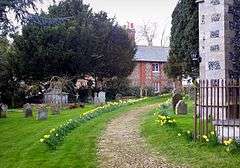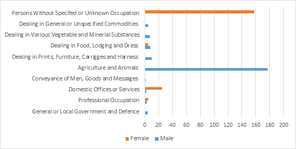Radwinter
| Radwinter | |
|---|---|
 St Mary's Church | |
 Radwinter | |
| Radwinter shown within Essex | |
| Population | 612 |
| Shire county | |
| Region | |
| Country | England |
| Sovereign state | United Kingdom |
| Police | Essex |
| Fire | Essex |
| Ambulance | East of England |
| EU Parliament | East of England |



Radwinter is a village and a civil parish on the B1053 road, in the Uttlesford district of the county of Essex, England. The population in the 2011 Census was 612[1] with 306 males and 306 females living in the parish.[2] Radwinter has a 14th Century church in the centre dedicated to St Mary the Virgin[3] and a primary school.[4] The village has four outlying hamlets in the district of Uttlesford in between the market town of Saffron Walden (Essex) and Haverhill (Suffolk).[5]
In the 1870s Radwinter was described as:
The parish comprises 3, 802 acres. Post-town, Saffron-Walden. Real property, £5, 365. Pop., 946. Houses, 214. The property is much subdivided. Radwinter Hall, Bendish Hall, and the Hill are chief residences.[6]
There is much local history of the parish dating back to the 1800s. "The parishwas once divided into Great Radwinter and Little Radwinter however this distinction is now lost".[7] There was also four manors in existence, Radwinter Hall, Brockhold's, Bendish Hall and Radwinter Grange. Most of what can be seen today in the centre of Radwinter is the work of the Bullock family, they were Lords of the Manor and rectors or Radwinter.[8]
Demographics
Population
The population has been changing since it started to be closely monitored in the 1801 census up to the present day. According to the 2011 census there was 612 people living in Radwinter, 25 of them aged 0–4, 125 aged 5–17, 460 ages 18–89 and 2 that are 90 and over, showing a small dependency ratio and a large working population.[9] In 1800 and 2011 the populations are similar, with a population of around 600 however the figures have fluctuated in-between these dates as seen in the graph. The boundary change in 1850 could be reason to why the population had a significant increase. The boundary increased from 3,100 acres in 1830 to 3,800 acres in 1850.[10] This caused the population figures to also increase from 819 in 1831 to 916 in 1951.[11]
Employment
The lifestyle of the people living in Radwinter has also been changing since the 1801 census. In 1881 nearly 160 women in the village did not have or had an unknown occupation and all the other women were in jobs such as domestic servants or dealing with food, lodgings and dress which was very traditional for that time period. Approximately 179 men in the village of Radwinter in 1881 had an occupation involving agriculture or animals showing the type of industry Radwinter once was. According to the 2011 census there were 165 males in employment aged 16 to 74. Of these around half are in roles evolving management, directors, senior officials, and other professional occupations.[12] The female population of Radwinter has 142 people aged 16 to 74 in employment. The diversity of jobs is wider than the males with 44 in professional occupations, 25 in administrative and secretarial occupations and 15 in caring, Housing leisure and other service occupations.[13]
Housing
In the 2011 census it was found that there were 229 households in Radwinter. 64 of them were of one family with a married or same sex civil partnership with dependant children, 21 were in the same type of household but with non- dependant children, and 34 has no children in the same type of household. 39 people live on their own in Radwinter, 24 of them being 65 and over.[14] The Current average value of a house in Radwinter in March 2017 is £632,311 which is a decline from December 2016 by 0.11%. Over the past ten years the value of the average house has increased by £159,117 which is approximately 33.6%. According to Zoopla estimates
"Terraced properties sold for a current average value of £318,902 and semi-detached properties valued £365,699. In the past year property prices in Radwinter have increased 6.39%".[15]
Community
With a small population of 612 the village is small and closely connected. In Radwinter there are approximately 250 houses. Many of the old houses and cottages date back to the Tudor times, built from oak timbers from the surrounding woodland areas. Other houses are older and have been altered as time passes and other houses were built more recently such as the 20th and 21st century houses seen around Radwinter.[16] The community centres around the parish church and post office but also has a village hall, a local primary school, a sport and recreation ground and a local public house and restaurant, The Plough Inn. The village contains several important buildings that are listed for their historical and architectural value. some of the buildings include The Old Dairy, The Old Bakehouse, The Old brewery and Church Hill Cottages, all of which are protected by law.[17]
Church
The Saint Mary the Virgin Church was first built in the 12th century from flint and white limestone with a roof made from tile and led,[18] and has stood for around 700 years. The last pair of arches towards the East are the oldest, the second and third arches were decorated with mediaeval paintings up in till the 1860s when they were painted over against the advise of architect William Eden Nestfield. In 1850 the porch, door and West tower, including a spire were added and between 1868 and 1882 the church was renovated and enlarged by architect William Eden Nesfield. Reverend John Frederick Walkinson Bullock undertook the restoration on his own initiative and mostly at his own expense. The restoration included the rebuild of the Chancel, south and north isles, and the celerestory being remade from old materials. The north and south organ chambers were also added to create the church that stands today.[19]
See also
References
- ↑ "Civil Parish population 2011". Retrieved 28 September 2015.
- ↑ "Radwinter (Parish): Key Figures for 2011 Census: Key Statistics". Neighbourhood Statistics. Office for National Statistics. Retrieved 2 February 2017.
- ↑ http://www.radwinterhistory.org.uk/radwinter/baptismspt4.html
- ↑ http://www.radwinter.essex.sch.uk/
- ↑ "Radwinter Village". Retrieved 21 March 2017.
- ↑ Wilson, John Marius (1870–72). Imperial Gazetteer of England and Wales. Edinburgh: a. Fullerton & Co.
- ↑ "Local History of Radwinter Village in Essex". www.radwinterhistory.org.uk. Retrieved 2017-05-03.
- ↑ "Radwinter History". Radwinter Village History. Retrieved 21 March 2017.
- ↑ Neighbourhood Statistics (2011). "Age structure 2011". Office For National Statistics. Retrieved 21 March 2017.
- ↑ "Radwinter CP/AP through time". Vision of Britain. Retrieved 28 March 2017.
- ↑ "Radwinter CP/AP through time;Population Statistics; Total Population". www.visionofbritain.org.uk. Retrieved 2017-03-28.
- ↑ "Occupation- Males, 2011". Office of National Statistics. 2011. Retrieved 28 March 2017.
- ↑ "Occupation- Females, 2011". Office of National Statistics. 2011. Retrieved 28 March 2017.
- ↑ "Household composition". Office of National statistics. 2011. Retrieved 28 March 2017.
- ↑ "House prices in Radwinter. Property values - Zoopla". www.zoopla.co.uk. Retrieved 2017-03-28.
- ↑ Briggs, James (January 2014). "Radwinter Parish Information Pack" (PDF). Radwinter. Retrieved 23 March 2017.
- ↑ Briggs, James (January 2014). "Radwinter Parish Information Pack" (PDF). Radwinter Parish Council. Retrieved 21 March 2017.
- ↑ Briggs, James (January 2014). "Radwinter Information Pack: Buildings" (PDF). Radwinter. Retrieved 23 March 2017.
- ↑ Brugley, Cecil (2004). "Saint Mary the Virgin". Radwinter Church. Retrieved 28 March 2017.
External links
- http://www.britishlistedbuildings.co.uk/england/essex/Radwinter
- http://www.visionofbritain.org.uk/place/place_page.jsp?p_id=6865